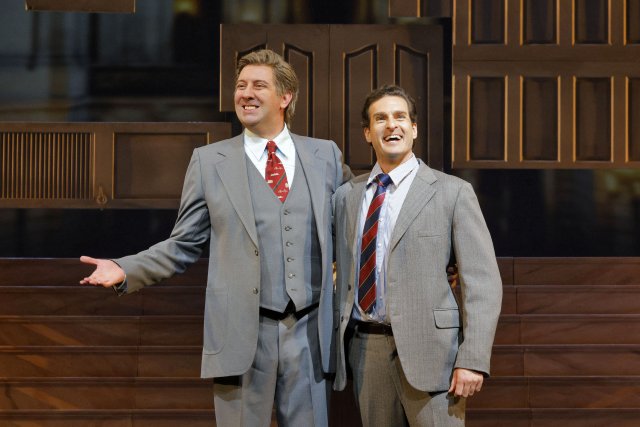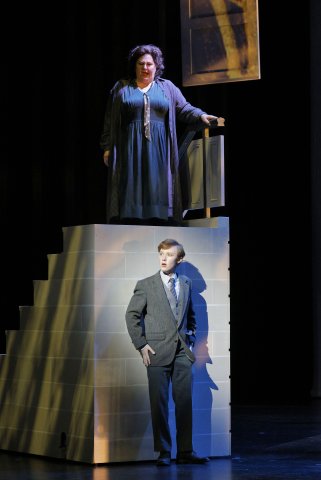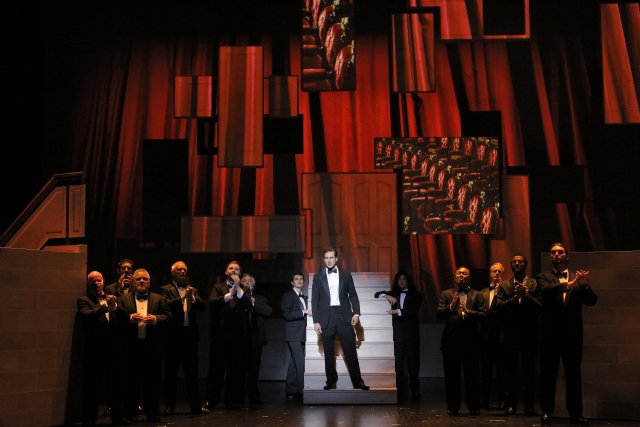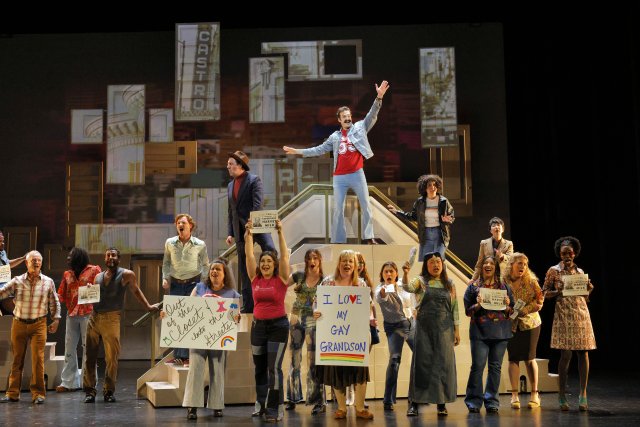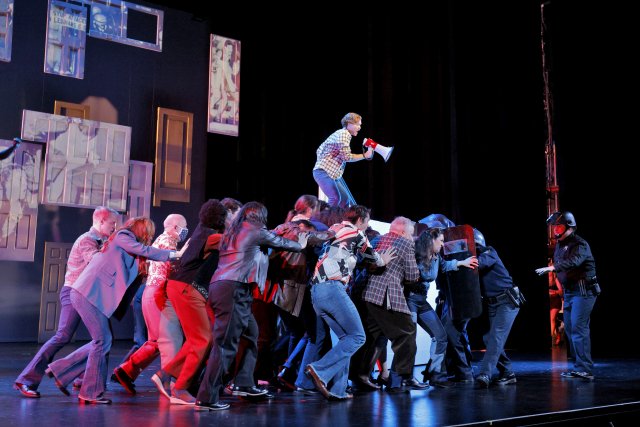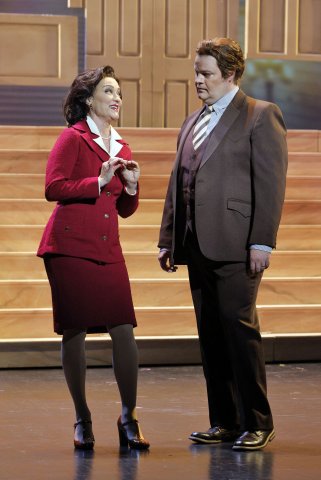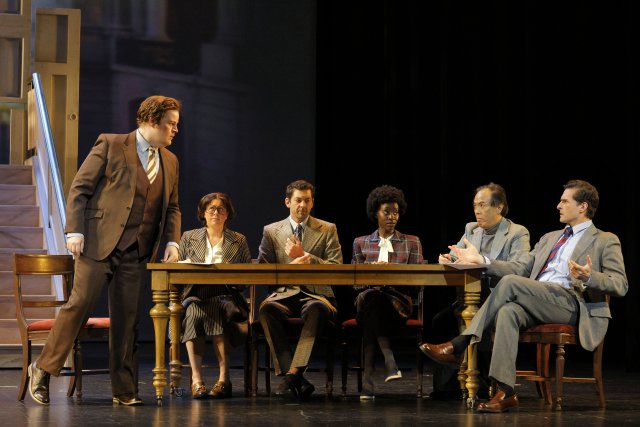Harvey Milk Reimagined
Opera Parallele Co-Commission of Revision Hits the Mark
By: Victor Cordell - Jun 02, 2025
Gay men are overrepresented in opera audiences, but only in 1995 did a gay man become the central figure in an opera. Notably, that first central figure had been the first openly gay man to be elected to a major city office, and tragically, the first to be assassinated.
Even though commissioned by primo opera companies, the original Harvey Milk suffered bloat in composition, story line, and cast. However, the arc of Milk’s life and death resonates with historic significance and operatic substance, thus Opera Parallèle and Opera Theater of Saint Louis commissioned a major revision that excels musically and dramatically with moments of poignancy, revelation, and joy. Its trimmed design facilitates production by smaller opera companies, so, unlike the original, this celebration of a great icon for equal rights for all should have legs.
The music is modern, yet accessible, with concise and meaningful lyrics. The revision emerges at a time when the equality for all that Harvey Milk fought for courageously is under attack from the very government that should be protecting everyone from discrimination.
The spectacular opening orchestration captivates aurally and the staging visually. A pastiche of sound (design by Ben Krames) incorporates the bombasity of a Philip Glass movie with chaotic clashing and gutteral throat singing, along with samples of the Scarpia theme from Puccini’s Tosca and Wagner’s motifs from The Ring Cycle and Der Fliegende Holländer. Brian Staufenbiel’s creative direction with Jacquelyn Scott’s scenic design stuns in its total angularity, wonderfully enhanced by Mextly Couzin's lighting and David Murakami's projections.
An upstage scattering of doors represents coming out of the closet. Four mobile staircases that can be variously separated and interlocked like so many Lego blocks, serve as an ascending platform for depicting action. They also symbolize Milk’s climb from anonymity to brief political and social consequence but lasting impact.
Though Harvey Milk became a San Francisco idol, composer Stewart Wallace and librettist Michael Korie sought to contextualize Milk’s evolution from his boyhood in Long Island, New York, and over one-third of the run time tracks his changes before moving to California. Tenor Curtis Resnick portrays the young and naïve Harvey. He learns from observing male attendees in formal wear after an opera at the Met that they differ from men in his small hometown, where bowling is the major diversion. He also learns that he is attracted to men, which becomes a life-defining moment that he can never share with his beloved Mama.
Early in Act 1, the libretto adeptly juggles multiple realities simultaneously. Harvey contends with the sexual changes that he feels and the closeted life he will lead in New York, even while a Goldwater Republican and Wall Street analyst. The gay men, represented by the men’s chorus, lead open lives but are traumatized by the riots at the Stonewall Inn. Meanwhile, Mama, portrayed in solitude by Catherine Cook, is haunted by memories of the Holocaust and fear for her son.
These events coalesce in Harvey’s mind. He conceives of his personal Star of David being comprised of the Nazi’s yellow triangle for Jews and pink triangle for homosexuals and sings the affecting aria “I remember.” This also leads to the beautiful duet “This warm night in June” with Scott Smith (played by Henry Benson), who would become his business partner as well as lover.
As the scene shifts to San Francisco, we meet the circle of people who would become famous along with Harvey. One of the strengths of the libretto is that the three central figures, Dan White (Christopher Oglesby), George Moscone (Matt Boehler), and Milk are depicted in shades of gray. Despite White’s premeditated villainy, we are told that he reflected common values – that he didn’t drink, smoke, or swear; that he had a history of civic employment and involvement; and that he had concern for his family. Of course, his common values sometimes came into conflict with those of the gay community as expressed in the bouncy anthem “Out of the closet and into the streets.”
The mature Harvey is portrayed by baritone Michael Kelly who personifies Harvey’s charisma, while revealing his imperfections along with his passions and anxieties. Notwithstanding his monumental contributions to his chosen cause, he could be expedient, and White’s resentment toward him derived from White’s feeling betrayed.
Though progressive, Moscone practiced realpolitik when needed. The event that triggered the assassinations was White’s resignation from the Board of Supervisors because of the financial sacrifice, shared in his telling aria “Beans and franks.” But he then wanted to return and insisted “A man can change his mind.” But Moscone, who initially signaled support for White’s return and controlled that decision, cruelly turned White’s words upon him when Moscone ultimately decided to deny the request.
Harvey Milk Reimagined engages on all levels with the score driven by the Nicole Paiement conducted orchestra. A minor criticism is that the title lacks clarity or vitality. Is this a rethinking of Harvey Milk as a person? Among myriad options, a fitting alternative would be Mayor of the Castro or The Life and Times of Harvey Milk. Afterall, Verdi refashioned Stiffelio as Aroldo, Gustavo III as Un Ballo in Maschera, and more.
A more substantive and emphatic criticism is the amplification of voices. Opera’s central fascination perhaps is the human voice receiving its highest possible expression, with one acoustic singer thrilling the ears of up to thousands of listeners or a single soprano soaring above a chorus of many. Modern composers, John Adams being the foremost, who abandon the virtue of a well-trained voice, reduce the vocal grandeur of a Pavarotti to an equivalency with a common lounge singer. What is the excitement of a home run if the walls are moved to just behind the base paths? With micing, evaluating or appreciating the quality of a singer’s voice becomes futile, so with due respect to the artists, I’ll pass on that.
Fortunately, Harvey Milk Reimagined has much to recommend it. Hopefully, the decision makers in future productions will reserve amplification for special effects.
Harvey Milk Reimagined, composed by Stewart Wallace with libretto by Michael Korie, is produced by Opera Parallèle and appears at Blue Shield Theater at YBCA, 700 Howard Street, San Francisco, CA through June 7, 2025.

